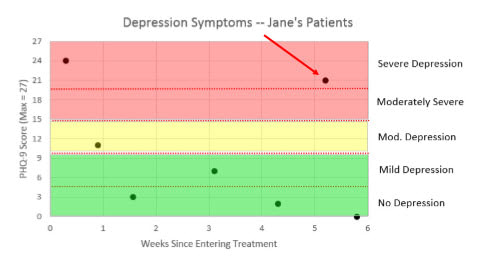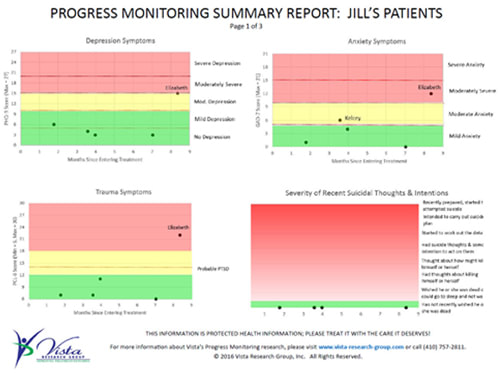With treatment center managers often overseeing 25, 50 or even more patients at a time, it can be difficult to know how each of your patients is progressing in treatment. Vista’s state-of-the-art Progress Monitoring products, INSIGHT Addiction™ and INSIGHT Behavioral™ collect this information online from your patients and summarize it for you.
The INSIGHT products track the severity of depression, anxiety, trauma, and eating disorder symptoms as well as suicidal ideation, self-harming behavior and satisfaction with treatment while your patients are in treatment. INSIGHT Addiction™ also tracks drug and alcohol use and the strength and frequency of cravings. Both products report these results in easy-to-understand graphs to your counselors.
Rather than making you look through dozens of individual reports each week to get a quick read on how the patients at your center are doing, we’ve created INSIGHT Group Summaries. These reports show just the most recent data point for each patient being monitored for a particular condition, grouped by counselor. Because we expect patients to start feeling better after they’ve been in treatment for a short time, their scores are displayed as a function of how long the patient has been in treatment.
The following graph shows the most recent PHQ-9 scores for Jane’s seven patients struggling with depression:
 |
While a few of the patients who have recently entered treatment are reporting feeling depressed, most of the patients who’ve been in treatment for several weeks are feeling much better. The exception is the patient who has been in treatment for more than 5 weeks and still reports feeling severely depressed. This patient is not progressing as well as expected and may need additional help.
INSIGHT labels the patients whose scores are in the danger zone and combines all the graphs for each counselor in one report. This makes it very easy to see at a glance which of the counselor’s patients aren’t doing as well in treatment as expected:
 |
Our clients have been able to use this information to provide targeted help to patients who are struggling. If this kind of knowledge would be helpful to your organization, let's talk! Please call us at (800) 215-3201 ext 1.



